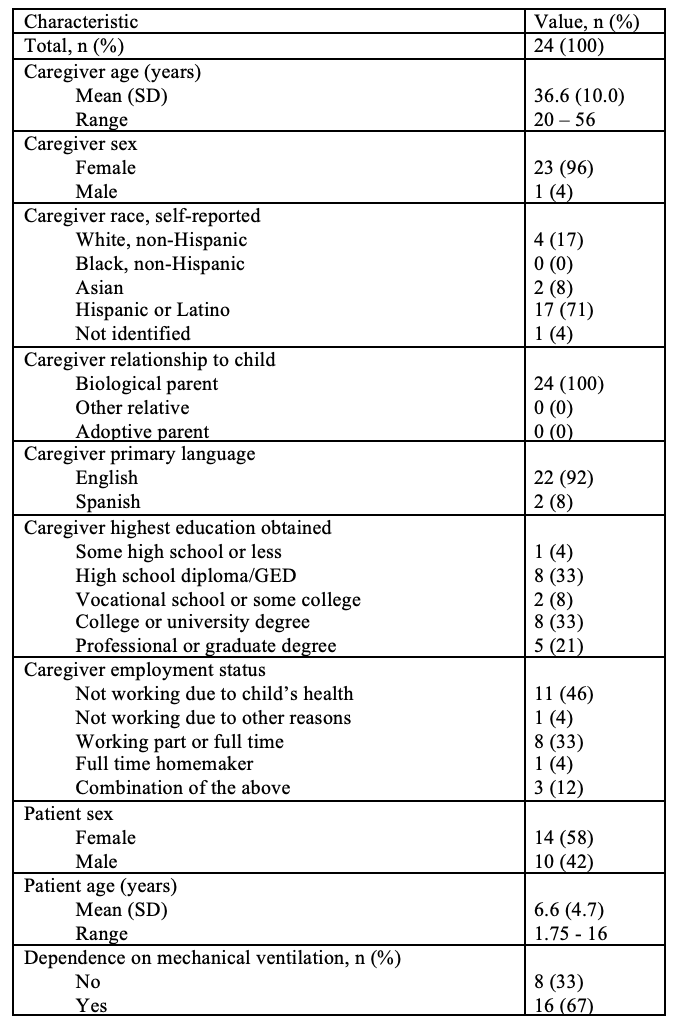Children with Chronic Conditions
Children with Chronic Conditions 1
724 - The association of perceived discrimination and home healthcare on the health-related quality of life in caregivers of children with tracheostomy: A single site cross-sectional cohort study
Friday, April 28, 2023
5:15 PM - 7:15 PM ET
Poster Number: 724
Publication Number: 724.105
Publication Number: 724.105
Natalia I. Sidhu, Children's Hospital Los Angeles, Los Angeles, CA, United States; Tess van Schoor, Children's Hospital Los Angeles, Los Angeles, CA, United States; My H. Vu, Children's Hospital Los Angeles, Los Angeles, CA, United States; Ashwini Lakshmanan, Kaiser Permanente Bernard J. Tyson School of Medicine, Pasadena, CA, United States; Tamara D. Simon, Keck School of Medicine of the University of Southern California, Burbank, CA, United States; Christopher J. Russell, Children's Hospital Los Angeles, Los Angeles, CA, United States

Natalia I. Sidhu, MD, MS (she/her/hers)
Fellow
Children's Hospital Los Angeles
Los Angeles, California, United States
Presenting Author(s)
Background: Increasingly, the care of U.S. children with tracheostomy has shifted from institution-based to home-based care with variable in-home nursing support. Prior studies show that caregivers of these children have lower health-related quality of life (HRQOL). Factors that affect this population’s HRQOL are not fully understood.
Objective: To determine the association of perceived discrimination in medical settings and home healthcare (HHC) on HRQOL of caregivers of children with tracheostomy.
Design/Methods: We performed a single-center cross-sectional cohort study across inpatient units of a quaternary free-standing children’s hospital. On admission, we administered validated surveys for caregiver self-assessment of HRQOL (PedsQL Family Impact Module Version 2.0), perceived discrimination (Discrimination in Medical Settings (DMS)), HHC quality and patient-family centeredness (PediHome) to English and Spanish-speaking caregivers of patients with tracheostomy ages 6 months to 21 years who have received at least 6 months of care in the home. Multivariate regression models adjusting for caregiver age, race, and level of education were utilized to evaluate the association between total HRQOL scores and the results of each DMS and PediHome.
Results: We enrolled 24 biological parents of children with tracheostomy, 17 (71%) of whom identify as Hispanic or Latino and 16 (67%) of whom care for a child on home mechanical ventilation (Table). The cohort’s mean score was 54.02 (SD 16.12; out of 100) for total HRQOL. Twelve (50%) parents reported having experienced discrimination at least once in the medical setting. Sixteen (67%) caregivers reported access to HHC in the year preceding survey administration; the cohort’s mean scores were 6.94 (SD 2.84; out of 10) for HHC quality and 27.93 (SD 5.85; out of 36) for degree of patient-family centeredness. Caregivers who reported never having experienced discrimination in the medical setting had higher HRQOL scores (β=16.3, 95% CI: [1.8, 30.8], p=0.03). Overall quality and patient-family centeredness were each positively associated with total HRQOL score (β=4.8, 95% CI: [2.1, 7.5], p=0.002) and β=2.6, 95% CI: [0.98, 4.2], p=0.005).
Conclusion(s): Absence of perceived discrimination in medical settings and access to high-quality and patient-family centered HHC each positively impact HRQOL of caregivers of children with tracheostomy, regardless of parent age, race, or level of education. This study highlights the need for equitable, family-centered care to support patients and their families in both medical and home settings.

